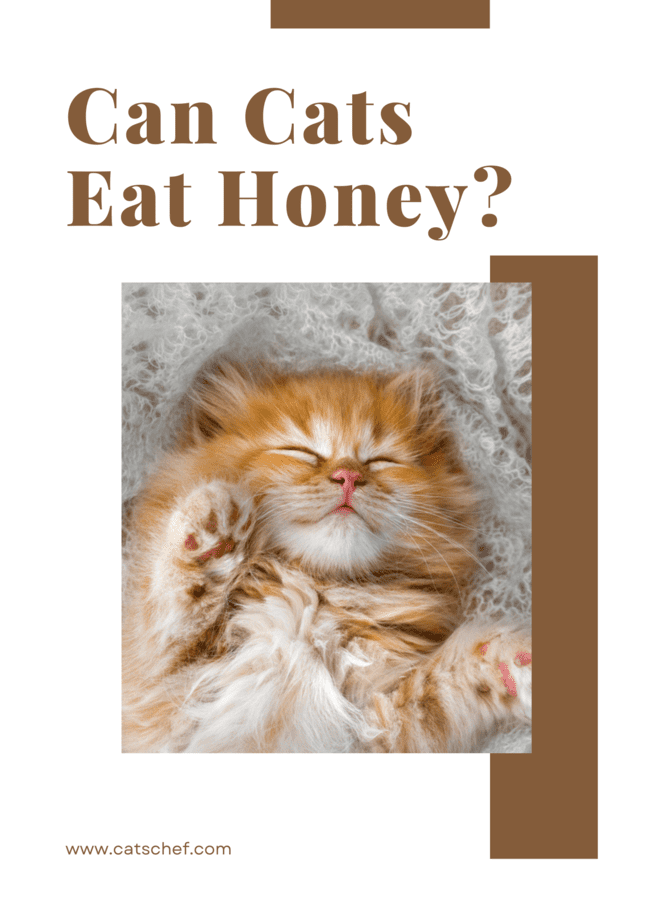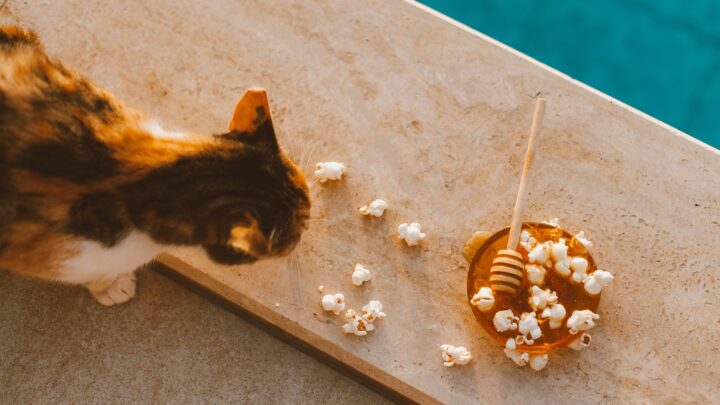Who doesn’t love putting honey on pretty much everything? This golden goose of foods goes great with your Earl Gray tea, drizzled over your Sunday morning breakfast pancakes, and coated over your favorite roasted carrots. And your four-legged friend couldn’t agree more. But, can cats eat honey!?
Your cat certainly wants to! Whenever you bring out the big guns (the biggest tub of manuka honey you could find in the store), she starts meowing and begging for your to let her give it a lick. And let’s be honest, you weren’t able to say no to her on more than one occasion.
After all, how can honey even be bad? It’s one of the most delicious things on Earth, it has antidepressant, anticonvulsant, and anti-anxiety properties, and it’s beaming with antioxidants. That might sound like a lot of antis, but trust me, they’re good… for humans.
You haven’t really thought of including this sweet syrup in your cat’s diet. You have no idea whether those antis would be good for cats. But, you wouldn’t mind giving her a spoonful of honey if you knew it would help with her seasonal allergies, sore throat, and other health problems.
Luckily, your “can cats eat honey” search mission brought you to the right place. According to our friends over at the ASPCA, cats can eat honey. But… There’s always a but when it comes to feeding your cat anything that isn’t supposed to be a regular part of her diet.
Keep on reading to find out everything you need to know about the complicated relationship between the nectar of the Gods and your feline friend. Let’s start from the beginning, shall we?
Do cats like honey?
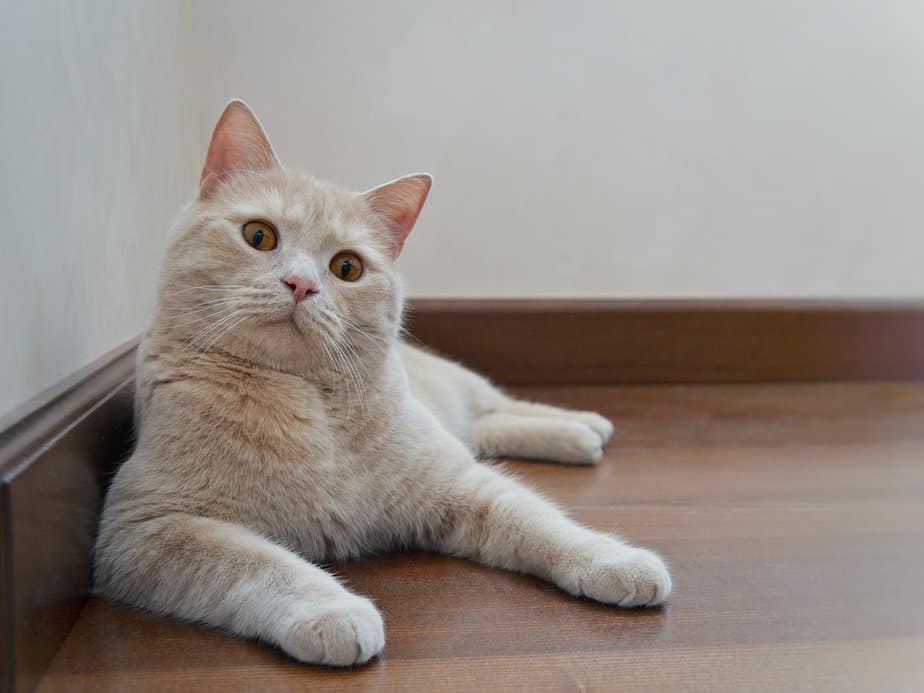
“Curiosity killed the cat”, but let’s hope it doesn’t do the same thing to your furry friend.
She’s a curious creature and she certainly doesn’t mind exploring the secrets of your kitchen whenever you’re busy doing something else. She’s bound to stumble upon a thing of honey at one point or the other.
She also doesn’t mind meowing your ears off until you succumb to the pressure and let her have a taste. Why does she get bored with cat food so easily? Why does she love human food more than anything else? And does she even like the taste of honey?
Believe it or not, cats are sweets-blind. They have a genetic condition that doesn’t make their sweetness receptors sensitive enough to taste the same things most animals (and humans) do. Actually, while most humans have thousands of tastebuds, cats only have a couple hundred.
But, there’s still a chance your cat can taste honey (which would explain why she seems to like it so much). She might not be able to taste the sweetness, but she’s probably able to taste something else within the honey itself (aka protein, fats, or other components).
And let’s not forget about the whole “monkey see, monkey do” thing (or, in this case, “cat see, cat do”)! Your cat is more likely to show interest in certain foods when she sees you devour them in one sitting. You’re eating a teaspoon of honey? She’s eating a tablespoon of honey!
So, can cats eat honey?
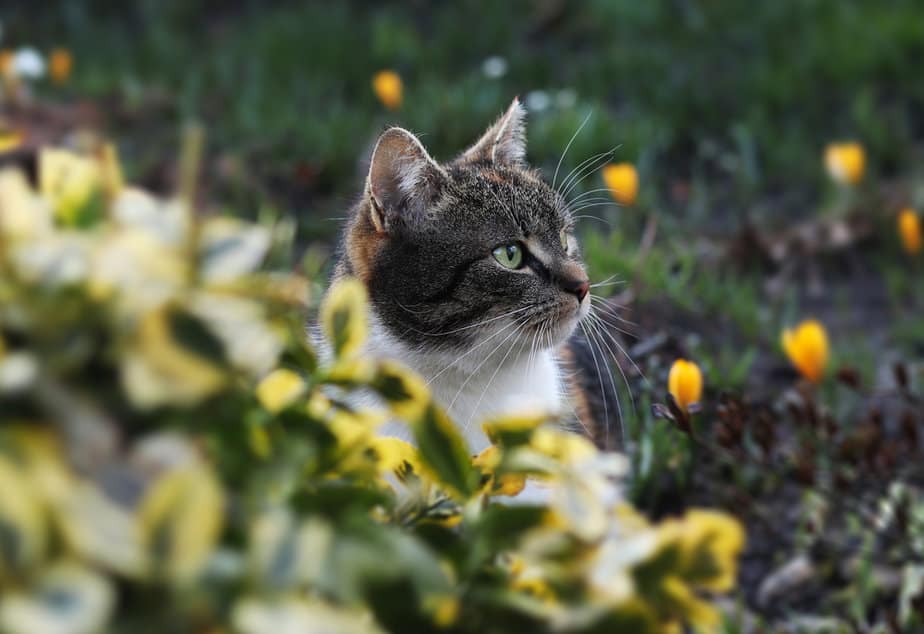
Feeding honey to your cat sounds like a great idea when you think about the nutritional and health benefits she might gain from this sweet syrup. Even a small amount of honey gives you energy, boosts your immune system, and gives you plenty of nutrients to start your day right.
But, honey doesn’t necessarily do the same thing for your cat. Cats are obligate carnivores which means they require meat, animal protein, and animal-sourced nutrients in their diet. That doesn’t mean they can’t eat anything else. But, it certainly does mean that they get the most benefits from these things.
Cats can eat honey, but can cats digest honey? Their digestive system isn’t equipped with the necessary enzymes to break down and process lactose, fructose, and glucose.
That might sound like a bunch of gibberish. However, these three things are responsible for sending your cat running to her litter box when she eats one too many spoonfuls of honey. Upset stomach, diarrhea, and vomiting are only some of the symptoms she might experience afterward.
So, honey seems to have a bunch of benefits and a bunch of drawbacks, making your decision that much harder. Give your vet a quick call, scroll down to learn more about the complicated relationship between cats and honey, and buckle up. You’re in for a ride!
When is honey good for cats?
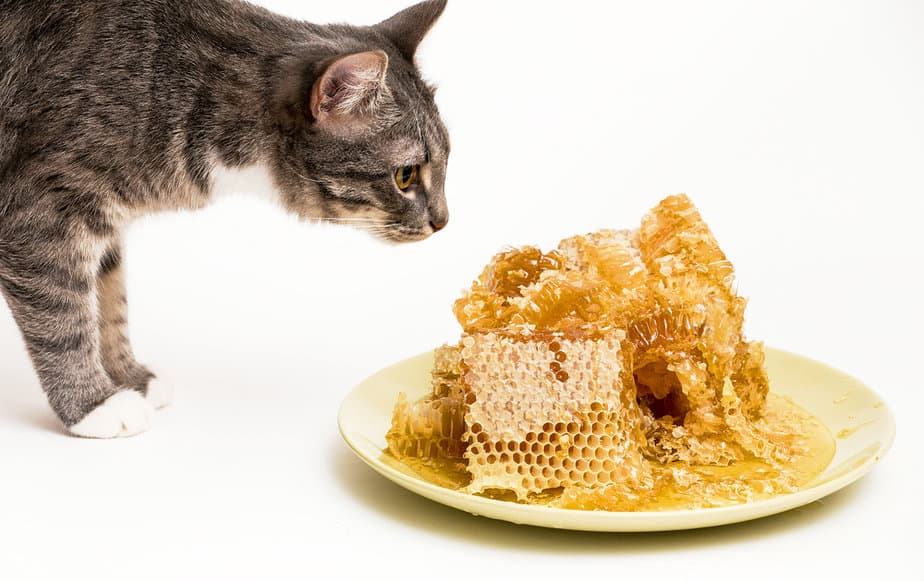
When you ask any human about their opinion on honey, they’re bound to tell you something along the lines of “honey is pretty much a miracle potion.” It has a bunch of vitamins, minerals, and antioxidants, and it makes for a sweet, nutritious, and delicious treat.
Additionally, it has loads of health benefits including the ability to soothe a sore throat, help with digestion, treat wounds, and even calm down allergic reactions. And it has anti-inflammatory, antifungal, and antibacterial properties. So yeah, you can say honey can be pretty great.
But, can it be great for your four-legged friend? Can cats eat honey? You might be disappointed to learn that a lot of these properties don’t apply to your cat. Not only does honey react differently in your cat’s stomach, but it’s also known to do more damage than anything else.
Don’t get completely discouraged because this doesn’t mean your cat shouldn’t enjoy an occasional lick of honey. It simply means that you have to make sure to be extra careful with the type of honey and the amount of honey you feed to your cat.
Here are a couple of things you can count on when you let your furry friend feast on a tiny amount of honey every now and then. Firstly, the antioxidants contained within this sweet syrup can boost her immune system.
Secondly, the antibacterial and anti-inflammatory properties can help her heal whenever she gets a bruise or a scratch. And lastly, honey can slightly soothe her allergies (but you might want to consult with your vet on that one).
However, the best thing you can do when you notice your cat might be getting the sniffles is to contact your vet and follow his advice to a tee.
When is honey bad for cats?
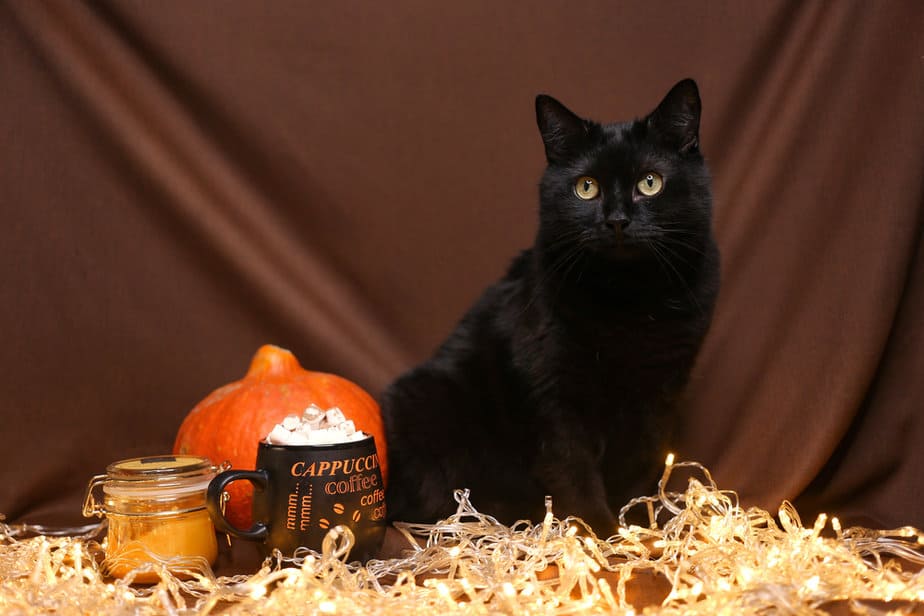
Let’s be honest, you can’t make a decision on whether cats can eat honey without looking at the long list of repercussions and adverse reactions. While this sweet syrup might be a great choice for you, it might give your cat quite a hard time in her litter box. Yeah, you read that right!
We’ve already mentioned how cats are carnivores and how they very have specific nutritional requirements. To your cat’s disappointment, honey doesn’t meet pretty much any of those requirements. While it’s rich in protein, dietary fiber, and antioxidants, it doesn’t make for a healthy cat treat.
Technically speaking, your cat can’t even have sweet treats. Your cat’s digestive system isn’t equipped to digest the sugar and other carbohydrates that can be found in most sweet treats. So, honey can only result in a bunch of digestive issues such as stomach aches, weight gain, obesity, and diabetes.
Don’t even get me started on diabetic cats! They shouldn’t come anywhere near this sweet syrup. It might cause them severe spikes in sugar levels and insulin levels. Trust me, that’s pretty much a general rule of thumb for cats with health issues. They have to keep their paws away from honey.
Another side effect of feeding your cat honey actually comes from raw honey. Raw honey is basically the unprocessed type of honey. It’s taken straight out of the beehive, strained, bottled, and ready to be enjoyed but everyone except for your cat.
Raw honey might contain something called botulinum. Botulinum can cause botulism or botulinum poisoning in cats which can result in permanent paralysis. Obviously, most cat parents avoid feeding their cats honey because they don’t want to take the risk.
So yes, cats can eat honey… But, at what cost?
Can kittens eat honey?
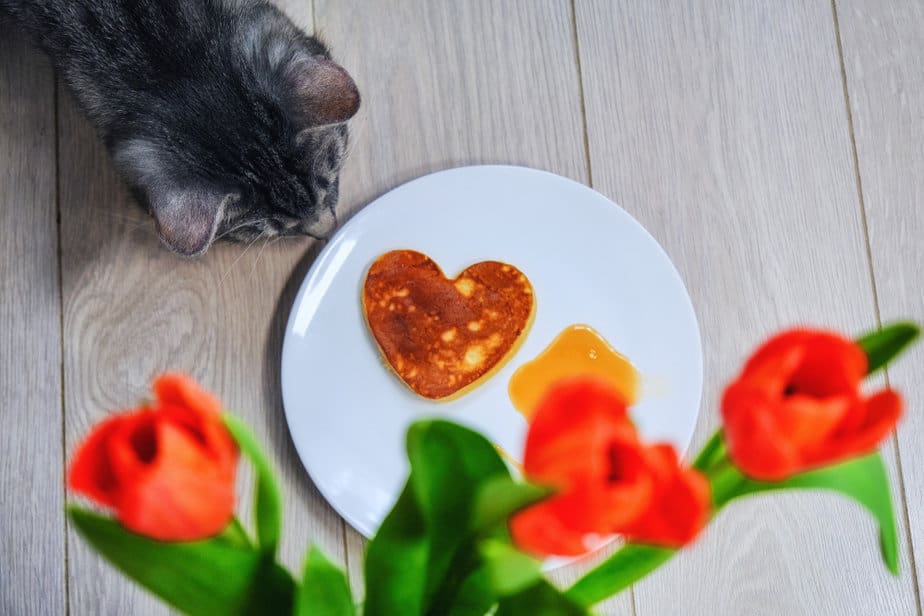
Absolutely not! Adult cats might not have that hard of a time digesting a couple of drops of honey, but we can’t say the same thing about young kittens.
Their digestive system isn’t equipped with the necessary enzymes to process such high levels of sugar. Not only that, young kittens aren’t supposed to eat pretty much anything other than their mother’s milk.
And even when they aren’t able to get hold of their mother’s milk, they’re supposed to eat kitten formula and kitten food. Honey might not be toxic to kittens, but it can cause a bunch of gastrointestinal problems including stomach aches, diarrhea, and vomiting.
Honey can also cause weight gain, obesity, and diabetes which can dangerously diminish the quality of your kitten’s life. Let’s just say your kitten doesn’t have to be in the room when you’re enjoying your sweet syrup.
Can cats eat raw honey?
We’ve already touched upon this question in one of the previous paragraphs. But, it doesn’t hurt to go over some of the most important points. After all, your furry friend won’t stop meowing and begging just because you’re unsure of the answer to the “can cats eat raw honey” question.
Cats can eat raw honey, sort of. Raw honey is just a different term for unprocessed honey (which is honey that’s been taken straight out of the beehive and bottled with no added ingredients). Raw honey can even be a better choice for your furry friend than processed honey, but…
There are a couple of things to consider before hopping online in search of local raw honey producers. Some pet parents believe that raw honey contains something called botulinum. Botulinum is pretty much a toxin that can cause permanent paralysis.
So, it’s safe to say that you shouldn’t feed raw honey to your cat. We can’t say that every bottle of honey contains this threatening toxin, but it’s better to be safe than sorry.
What about Manuka honey?
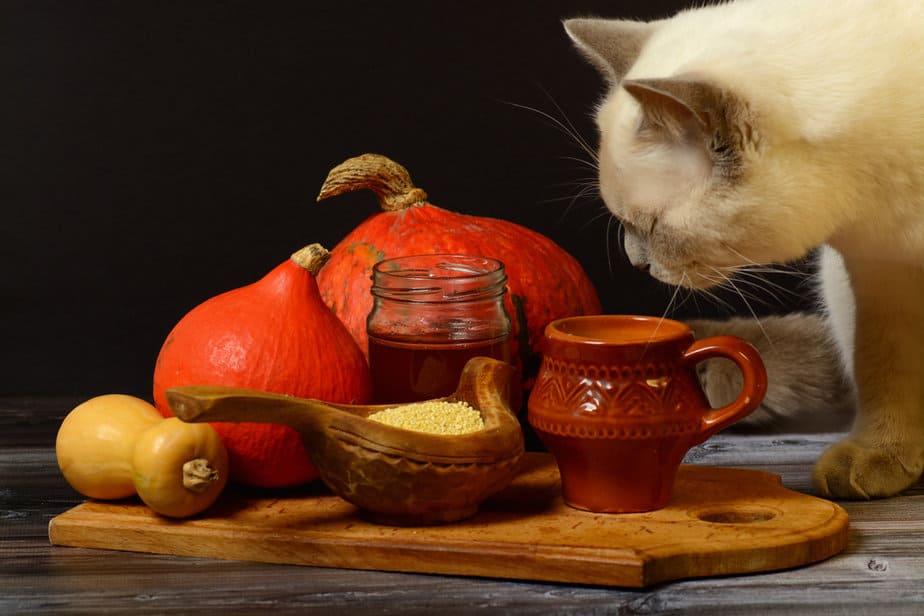
What’s so different about Manuka honey? Manuka honey’s generally known, loved, and used as a traditional remedy for pretty much everything. While regular, processed, or unprocessed honey can be used for the same purposes, Manuka honey holds the first place.
Regular honey can be made from different types of plants honey bees use to collect the nectar from. But, Manuka honey can only be made from the nectar of the Manuka plant that can only be found in Australia and New Zealand.
And yes, cats can eat Manuka honey! Same as with regular honey, they shouldn’t scoff down the entire bottle but they’re free to have a drop or two every now and then. Consult with your vet before using Manuka honey as a treatment for health problems, but other than that… Get another bottle for your furry friend.
Can cats eat honey nut cheerios?
They absolutely can! Well, they can have a couple of them… Kind of.
If your four-legged friend stumbled upon your secret stash of honey nut cheerios and decided to have a couple of them for dessert, you have nothing to worry about. A small number of honey nut cheerios shouldn’t cause any discomfort to your cat.
But, that doesn’t mean you should count on honey nut cheerios to provide your cat with her daily dose of vitamins, minerals, and antioxidants. Sweet treats like honey nut cheerios have high levels of sugar which makes them pretty hard on your cat’s stomach.
Unless you want to see your cat running to her litter box every fifteen minutes, you should keep these sweets out of your cat’s reach. So, cats can eat honey nut cheerios but that doesn’t mean that they should.
What about honey buns?

Oh, the deliciousness of the doughy pastry drizzled with honey and coated in cinnamon! Honey buns happen to be one of your favorite desserts and you can’t help but wonder “can cats eat honey buns?” Are these cinnamon rolls and donuts hybrids safe for your four-legged friend?
While honey buns aren’t necessarily toxic to cats, they contain ingredients that can harm your cat in the long run. Sugar, carbohydrates, and calories are only a few of the reasons why you should rethink the whole “sharing is caring” thing and devour that honeybun by yourself.
Unfortunately, cats can’t eat honey buns. But, you can count on carefully crafted cat treats whenever your furry friend decides to meow and beg for something she can much on.
And what about yogurt with honey?
Immediately no! Most cats are lactose intolerant which means they don’t have the necessary enzymes to break down and process the lactose in yogurt. Yogurt with honey might leave your cat with a bunch of digestive issues including stomach aches, vomiting, and diarrhea.
Additionally, this tasty treat can also contain artificial sweeteners like xylitol. Artificial sweeteners can lower your cat’s blood sugar levels and lead to something called hypoglycemia. And don’t even get me started on sugar which can lead to weight gain, obesity, and diabetes!
Don’t get me wrong, a spoonful of nonfat, plain yogurt drizzled with honey shouldn’t cause too many problems. But, it’s better to stay on the safe side when it comes to your cat’s health.
Cats can eat honey, but…
That doesn’t mean that they should. While it’s completely fine for you to use a little bit of honey to treat your cat’s wound or to let her take a couple of licks (with a green light from your vet), you shouldn’t treat honey as a regular part of your cat’s diet.
A little goes a long way when it comes to this sweet syrup!
